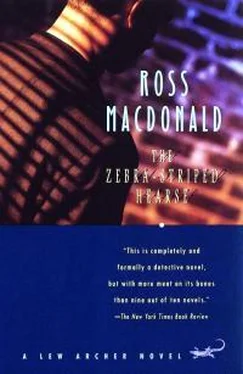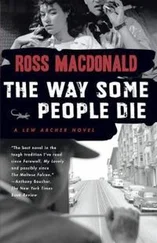The broken jigsaw of Los Angeles tilted and drifted backward into brownish smog. When the plane had leveled out at cruising altitude, the stewardess slipped into the empty seat beside me. She held a folded newspaper in the hand away from me. Under the make-up, her color wasn’t good.
“I found the seating chart for July – July ten. The man with Miss Blackwell, his name was Simpson, Q. R. Simpson.”
“I thought so.”
“You thought so?” Her look was accusing. “Why didn’t you tell me, then, that Señor Simpson is dead?”
“I wasn’t aware of it.” It was a half truth, or a half lie, according to which version of Simpson we were talking about. “How do you know he is, Miss Gomez?”
She held the morning Times under my nose, jabbing the late bulletins at the bottom of the front page with a chipped carmine fingernail.
“Slain Man Identified,” one of the items said.
The body of Quincy R. Simpson, found icepicked in a shallow grave in Citrus Junction last Friday, was positively identified late last night by his widow. The victim, missing for the past two months, was a resident of San Mateo County. Police suspect a gang killing, according to Sergeant Wesley Leonard of the Citrus County Sheriff’s office.
“You see,” Miss Gomez insisted, “he is dead. Murdered.”
“I see.”
“You said you are an investigator. Are you investigating his murder?”
“It’s beginning to look like it, isn’t it?”
“And you suspect someone from Mexico?” she said in a nationalistic way.
“Someone from the United States.”
This relieved her, but not for long. “Poor Miss Blackwell, she was so crazy about him. All the time, even when she was holding the lady’s baby, she kept looking at him like–” she searched for a phrase “–like he was a saint.”
“He was no saint.”
“Was he a ruffian – a gangster?”
“I doubt it.”
“It says in the paper that it was a gang killing.”
“Gangsters kill citizens, too.”
She wrinkled her dark brows over this idea. The doubleness of the conversation was getting on my nerves; or perhaps it was the doubleness of my attitude toward Damis. In spite of the evidence tightening around him, I was trying to keep an open mind.
I was glad when the girl went to attend to her duties. She stayed away. When she passed me in the aisle, she carefully avoided meeting my eyes. I think she was afraid of the contagion I carried from Simpson’s death.
We were flying over the sea within sight of land. The air was perfectly transparent. Baja California passed under the wing like the endless harsh shores of hell, its desolation unbroken by tree or house or human being.
As the sun declined, the shadows of the yellow hills lengthened into the dry valleys. The first green and brown checkerboard of cultivated fields came as a relief to the eye and the mind. The desolation didn’t go on forever.
Miss Gomez unbent a little when she brought me my dinner. “Are you enjoying the flight, sir?”
I said yes.
We circled in over Mazatlan in a red sunset. The three rocky islands offshore jutted up angrily out of a streaked purple sea. A single freighter lay in the harbor with the fishing boats. At the other end of the town, beyond the airport where we landed, new apartment buildings stood along the sea like a miniature Copacabana.
We were herded into the terminal building, to have our tourist cards checked, it was explained. A boy was selling, or trying to sell, costumed puppets which he manipulated on a string. His bare arms were almost as thin as the wooden arms of his dolls.
The line of passengers moved forward slowly in steamy heat. I got my turn at the battered rostrum-like desk where a man in an open-necked white shirt presided. He had pockmarks on his face, and they gave special emphasis to his question: “ Certificado de vacunación , señor ?”
I had none. No one had told me. That was a silly thing to say, but I said it. He leaned toward me not so much in anger as in sorrow.
“You must have the vacunación . I cannot permit you to enter–”
“How do I get one?”
“They will vacunate you ahora , now, here.”
He summoned an attendant in olive whipcord who escorted me to an office at the far end of the building. A dark and dumpy woman in white was waiting at the desk with a maternal smile. The white masonry wall behind her had jagged cracks in it.
“Vaccination?”
“I’m afraid so.”
She took my name and home address on a filing card. “Don’t worry, it won’t hurt, I never hurt ’em. Jacket off and roll up your left sleeve, please.”
She struck my arm smartly as the needle went in.
“You took it well,” she said. “Some of them keel over.”
“You speak good English.”
“Why not? I was a nurse’s aide in Fresno six years before I went into training. I got a married daughter in Los Angeles. You can roll down your sleeve now. You’ll probably have a reaction by tomorrow.”
I buttoned the cuff of my shirt and put on my jacket. “Do you give many of these impromptu vaccinations?”
“Two or three a day, at least, since the government clamped down. People are always forgetting their certificates, or else they didn’t get the word in the first place. They process so many at the L. A. airport that they get careless.”
I said, on the off-chance of learning something: “A man I know passed through here from L. A. some time in the last two months. I’m wondering if you had to vaccinate him.”
“What does he look like?”
I described Burke Damis.
She twisted her mouth to one side. “I think I do remember him. He had big fat biceps, like yours. But he didn’t like the needle. He tried to talk himself out of it.”
“When was this?”
“I couldn’t say exactly. A couple of months ago, like you said. I could look it up if you’ll give me his name.”
“Quincy Ralph Simpson.”
She opened one of the desk drawers, went through a filing box of cards, and picked out one of them.
“Here it is, Simpson. I gave him his shot on May twenty.”
It meant that Burke Damis had entered Mexico two days after the original Simpson left home for the last time. It probably meant that Simpson had been murdered between May 18 and May 20, more likely than not by the man who had stolen his name.
“A very nice-appearing young man,” the woman was saying. “We had a nice chat after we got the vaccination out of the way.”
“Chat about what?”
“My daughter in Los Angeles. And he wanted to know if that was earthquake damage.” She waved her hand toward the cracks in the masonry.
“I was asking myself the same thing.”
“It was no earthquake. The hurricane did it. It practically tore out the whole end of the building. You’d never know it was built in the last ten years.”
The man in the whipcord uniform came back. He had two more victims with him, a young couple who were explaining that they had been assured that these formalities could be taken care of when they got to Mexico City. The nurse smiled at them maternally.
IT WAS RAINING HARD when we put down at Guadalajara, as if our descent had ruptured a membrane in the lower sky. In spite of the newspaper tent I held over my head, the short walk from the plane to the terminal pasted my clothes to my back.
I exchanged some damp dollars for some dry pesos and asked the cashier to get me an English-speaking taxi driver, if possible. The porter he dispatched reappeared with a man in a plastic raincoat who grinned at me from under his dripping mustache.
“Yessir, where you want to go?”
“Ajijic, if they have a hotel there.”
Читать дальше












